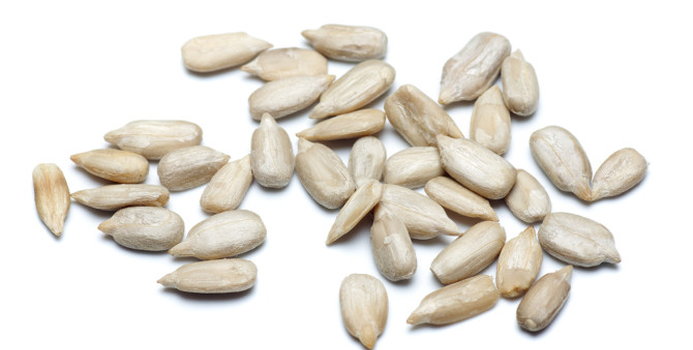As small and unimpressive as they seem, sunflower seeds are packed with nutrition. You can commonly find them in their black and white husks or de-shelled for more convenient snacking. Substituting bacon bits with a handful of sunflower seeds in your salad not only gives it a bold and nutty taste, it is also much better for your health. Sunflower seeds contain a high quantity of healthy fats, proteins, fiber and essential vitamins and minerals to keep your body running at an optimum level.
Essential Fatty Acids
Most calories in sunflower seeds come from its fat content. One ounce of de-shelled seeds tallies about 163 calories with 14 grams of fat. However, you should not be alarmed about this fat. Ninety-three percent of the fat in sunflower seeds is beneficial to your health.
Sunflower seeds contain a good balance of mono-unsaturated and poly-unsaturated fatty acids that help remove the plaque that can form low-density lipoproteins (LDL) in your blood vessels. This reduces your risk of strokes and heart attacks. Regular intake of sunflower seeds can significantly improve your cardiovascular integrity.
The most notable pro-health fatty acid in sunflower seeds is linolenic acid (LA). This is a powerful antioxidant that has proven effectiveness in the prevention of many types of infectious diseases as well as cancer.
Vitamin E
This fat-soluble vitamin is one of the strongest and fastest-acting antioxidants found in nature. Vitamin E has immediate free-radical removing capability and thus significantly lowers your risks of inflammation and tumor growth. Regular intake of vitamin E is essential to maintaining healthy skin, hair and blood vessels, as well as preventing cancer. Each ounce of sunflower seeds gives you 37% of your daily need for vitamin E.
Folate
Sunflower seeds are also a great source of folate. An ounce of sunflower seeds contain about 17% your recommended intake of folate. Sufficient intake of folate is crucial to having healthy red blood cells, bone integrity and proper mental function. If you're an expectant or nursing mother, you need to double your intake of folate to ensure optimal development of your baby.
Pantothenic Acid
Pantothenic acid is also known as vitamin B5. Your body needs sufficient amounts of this essential vitamin to produce energy, make hormones, and ensure correct DNA replication. Sunflower seeds have an abundance of pantothenic acid. Twenty percent of your total daily need can be supplied by just one ounce of seeds. Having a regular intake of sunflower seeds can keep your body energized and reduces your stress level. You will also be better protected against insomnia, diabetes and rheumatoid arthritis.
Selenium
Sunflower seeds are excellent providers of selenium. Every ounce of sunflower seeds gives you 32% of your daily selenium requirement. This trace nutrient is a structural component to many enzymes and it is also an antioxidant. Studies have proved selenium to be a powerful anticancer and anti-aging agent. Researches have also demonstrated that you are less at risks for diabetes and infections with adequate selenium intake.



